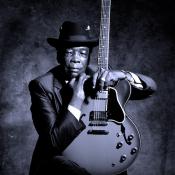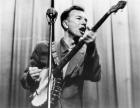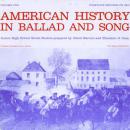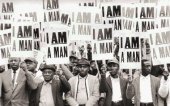No food on my table
And no shoes to go on my feet
No food on my table
And no shoes to go on my feet
My children cry for mercy
They got no place to call your own.
Hard times, hard times
Hard times seems like they’re here to stay
Hard times, hard times
Hard times seems like they’re here to stay
If someone don't help me
And I just can't be around free much long.
No shoes on my feet
And no food to go on my table
Oh no, too sad
Children crying for bread.
And no shoes to go on my feet
No food on my table
And no shoes to go on my feet
My children cry for mercy
They got no place to call your own.
Hard times, hard times
Hard times seems like they’re here to stay
Hard times, hard times
Hard times seems like they’re here to stay
If someone don't help me
And I just can't be around free much long.
No shoes on my feet
And no food to go on my table
Oh no, too sad
Children crying for bread.
inviata da Bernart Bartleby - 13/1/2016 - 21:05
Lingua: Gaelico irlandese
Irish Transcreation by Gabriel Rosenstock
NÍL BIA AR AN MBORD
Níl bia ar an mbord
Is tá mo chosa gan bhróg
Níl bia ar an mbord
Is tá mo chosa gan bhróg
Trócaire, a deir na leanaí
Mar nach bhfuil díon os a gcionn
Drochshaol, drochshaol
Drochshaol, drochshaol atá lán d'éad
Drochshaol, drochshaol
Drochshaol, drochshaol atá lán d'éad
Mura bhfaighimse lámh chúnta
Ní bheidh mé anseo i gceann trí mhí
Níl bia ar an mbord
Is tá mo chosa gan bhróg
Níl bia ar an mbord
Is tá mo chosa gan bhróg
Trócaire, a deir na leanaí
Mar nach bhfuil díon os a gcionn
Drochshaol, drochshaol
Drochshaol, drochshaol atá lán d'éad
Drochshaol, drochshaol
Drochshaol, drochshaol atá lán d'éad
Mura bhfaighimse lámh chúnta
Ní bheidh mé anseo i gceann trí mhí
Mo chosa gan bhróg
Is níl aon bhia ag dul ar an mbord
Mo chosa gan bhróg
Is níl aon bhia ag dul ar an mbord
Ó, nach brónach!
Scread aráin na leanaí.
Níl bia ar an mbord
Is tá mo chosa gan bhróg
Níl bia ar an mbord
Is tá mo chosa gan bhróg
Trócaire, a deir na leanaí
Mar nach bhfuil díon os a gcionn
Drochshaol, drochshaol
Drochshaol, drochshaol atá lán d'éad
Drochshaol, drochshaol
Drochshaol, drochshaol atá lán d'éad
Mura bhfaighimse lámh chúnta
Ní bheidh mé anseo i gceann trí mhí
Níl bia ar an mbord
Is tá mo chosa gan bhróg
Níl bia ar an mbord
Is tá mo chosa gan bhróg
Trócaire, a deir na leanaí
Mar nach bhfuil díon os a gcionn
Drochshaol, drochshaol
Drochshaol, drochshaol atá lán d'éad
Drochshaol, drochshaol
Drochshaol, drochshaol atá lán d'éad
Mura bhfaighimse lámh chúnta
Ní bheidh mé anseo i gceann trí mhí
Mo chosa gan bhróg
Is níl aon bhia ag dul ar an mbord
Mo chosa gan bhróg
Is níl aon bhia ag dul ar an mbord
Ó, nach brónach!
Scread aráin na leanaí.
inviata da Gabriel Rosenstock - 27/7/2018 - 17:16
×
![]()








Singolo del 1960 poi incluso, come traccia d’apertura, nell’album “Travelin’”
John Lee Hooker’s No Shoes Blues
An astoundingly high number of the nation’s most masterful blues musicians were born in Mississippi. In Ted Gioia’s book, “Delta Blues” (2008), Detroit bluesman John Lee Hooker offered his own reason why: “I know why the best blues artists come from Mississippi,” said Hooker. “Because it’s the worst state. You have the blues all right if you’re down in Mississippi.”
As Nigel Williamson wrote in “The Rough Guide to the Blues” (2007): “The social and economic problems of the Delta region persist to this day, the product and result of its history of enslavement and the legacies of the cotton plantation era, including the Jim Crow laws, racial segregation of public educational institutions and black disenfranchisement.”
John Lee Hooker was born outside Clarksdale, Mississippi, and as soon as he came of age, he moved to Detroit, where he became one of the pre-eminent blues musicians of his era, with hard-partying boogie music like “Boogie Chillen,” “Boom Boom” and “Dimples.” But Hooker also sang the “Hobo Blues” about riding the rails endlessly, and “House Rent Boogie” about holding parties to raise the rent after being evicted.
Perhaps Hooker’s Mississippi roots show up most clearly in his stark and terribly sad song, “No Shoes”, written in 1960, just as the nation was finally beginning to become aware of the extent of hunger in Mississippi. Hooker’s song reveals the story of hunger in America more tellingly than any Congressional fact-finding tour.
My children cry for mercy, they got no place to call your own.”
Hooker’s voice is so sympathetic and poignant, nearly sobbing about the hunger and hardships facing his children. “My children cry for mercy,” he sings, yet it is Hooker’s powerful, deep voice that cries out for mercy.
It is fascinating to hear this king of the boogie utilize his rough, growling voice to offer such a tender and kind-hearted plea for mercy for the children. Even his raw and primal electric guitar sounds beautiful and mournful. It becomes another voice asking for compassion. If ever the most rough-edged brand of Delta blues can be said to be sensitive, this is it.
Hooker ends his short song with an unforgettable image from the Other America — an indictment of society’s failure to care about malnourished children.
Children crying for bread.”
In an interview in the book, “Elwood’s Blues: Interviews with the Blues Legends and Stars” by Dan Aykroyd (2004), John Lee Hooker said, “I look at the people in the streets, sleeping in the streets — hard time. I wonder why these people have to do that. If we get out and reach out to those people, it would be a better world. I can’t save the world, but I cannot forget about the poor people working in the plants and the fields and buying John Lee Hooker’s records. Wasn’t for them, I wouldn’t be here.”
(estratto da Blues from the Streets of ‘The Other America’, di Terry Messman)